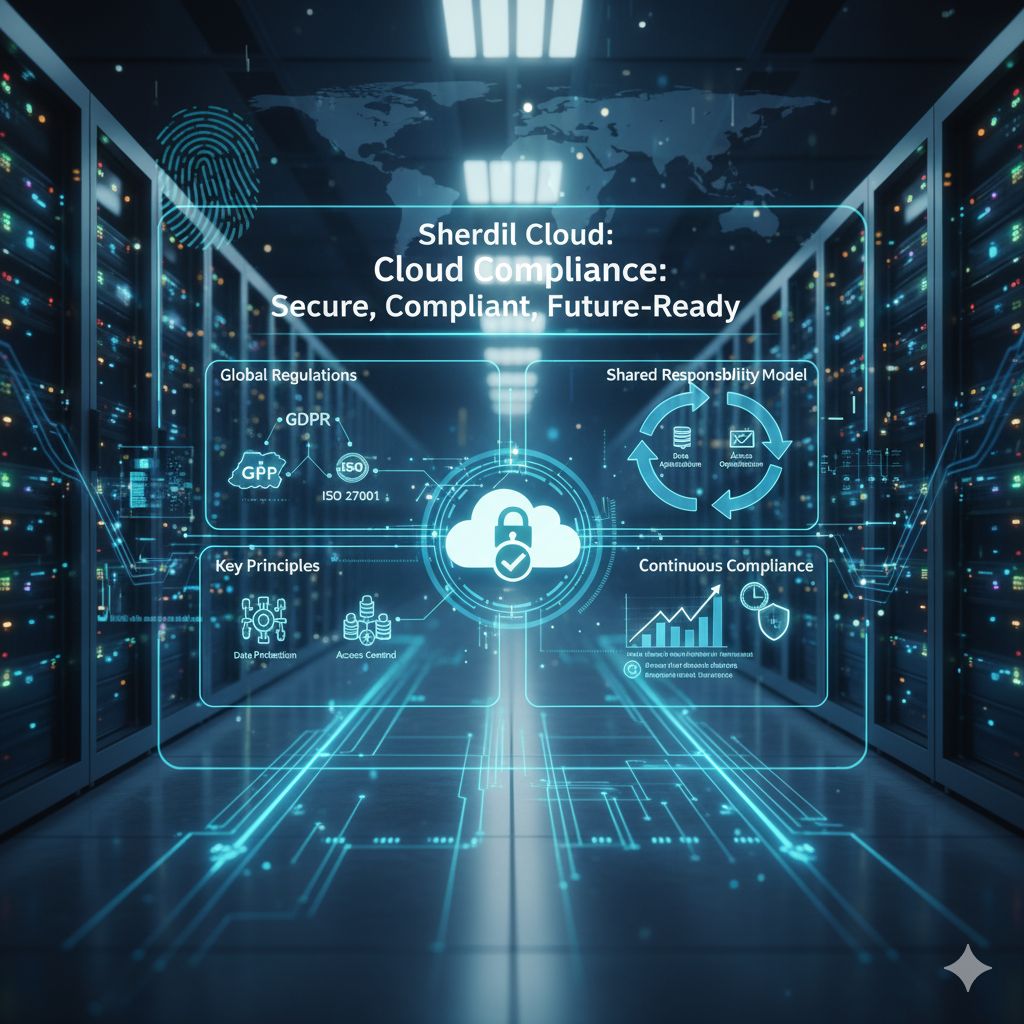As more companies move their workloads to the cloud, staying compliant with global standards has become more challenging and more essential than ever. The cloud promises scalability, agility, and efficiency, but without a strong compliance strategy, businesses face serious operational, financial, and legal risks.
At Sherdil Cloud, we believe compliance shouldn’t be a barrier, it should be a strategic advantage. Whether it’s GDPR, ISO 27001, SOC 2, or any other global standard, we help organizations embed compliance into the foundation of their cloud environments, making security and governance effortless, continuous, and fully aligned with business goals.
Understanding Cloud Compliance
Cloud compliance means ensuring that your cloud operations follow all legal, regulatory, and industry standards for data security, storage, and processing.
But unlike traditional IT, cloud environments use a shared responsibility model, where:
Cloud Providers (AWS, Azure, GCP)
✔ Secure the infrastructure
✔ Manage physical hardware, networking, and core services
Your Organization
✔ Protects data, users, access controls, and application configurations
Sherdil Cloud helps businesses clearly understand these responsibilities and close any compliance gaps at every layer—from infrastructure to user access.
The Big Three Compliance Standards: GDPR, ISO 27001 & SOC 2
1. GDPR — Protecting Personal Data
GDPR protects the personal data of EU citizens, but it applies to any company that handles EU data, no matter where it’s located.
Key GDPR Requirements:
-Explicit consent for data use
– Data minimization
– Right to erasure (“Right to be forgotten”)
– 72-hour breach reporting
Sherdil Cloud helps companies implement GDPR-aligned encryption, anonymization, IAM, and audit controls, protecting privacy without slowing down operations.
2. ISO 27001 — Global Standard for Information Security
ISO 27001 proves that your business follows world-class security practices.
How Sherdil Cloud enables ISO compliance:
– Conduct full risk assessments
– Build an enterprise-wide ISMS
– Implement encryption & access control policies
– Enable continuous compliance monitoring
– Prepare documentation for certification audits
We help organizations achieve and maintain ISO 27001 with confidence.
3. SOC 2 — Essential for SaaS, Finance, and Healthcare
SOC 2 focuses on 5 trust principles:
- Security
- Availability
- Processing Integrity
- Confidentiality
- Privacy
Sherdil Cloud builds SOC-ready systems by enabling logging, intrusion detection, access reviews, and full traceability across your cloud environment.
Why Cloud Compliance Really Matters
Compliance isn’t just about avoiding penalties. It’s about:
– Building trust with customers
– Reducing risk across the organization
– Improving operational efficiency
– Expanding into global markets
Sherdil Cloud turns compliance into a competitive edge, not a burden.
Sherdil Cloud’s Compliance Framework: Simple, Automated, End-to-End
1. Compliance Assessment & Gap Analysis
We identify vulnerabilities, misconfigured settings, and missing controls.
2. Governance & Policy Implementation
We create tailored policies for access, encryption, logging, incident response, and vendor management.
3. Automation & Continuous Monitoring
Using AWS Config, Azure Policy, Google SCC, and custom tools, we ensure real-time compliance visibility.
4. Documentation & Audit-Ready Reporting
We prepare the logs, reports, and validation documents needed for GDPR, ISO, SOC, or internal audits.
Common Cloud Compliance Challenges
| Challenge | Sherdil Cloud Solution |
|---|---|
| Data residency & sovereignty | Region-specific storage, geo-fencing |
| Inconsistent cloud configurations | Infrastructure as Code (IaC) standardization |
| Manual audits & lack of visibility | Automated compliance dashboards |
| Unsecured APIs | Enforced RBAC, encryption & API security |
| No continuous monitoring | 24/7 compliance tracking & alerts |
With Sherdil Cloud, compliance becomes a continuous, automated workflow, not a one-time task.
Leveraging Cloud Providers’ Built-In Compliance
AWS
ISO 27001, GDPR, SOC 1/2/3 certified services
Azure
Ready-made compliance templates & automated policy enforcement
Google Cloud
GDPR, ISO compliance across major services
Sherdil Cloud maps your workloads to these certified offerings to eliminate unnecessary complexity.
The Future of Cloud Compliance: AI, Automation & Zero-Trust
In 2025 and beyond, compliance will be:
–Automated
– AI-driven
– Self-correcting
– Predictive, not reactive
Sherdil Cloud is already enabling:
- AI-based anomaly detection
- Automated remediation of misconfigurations
- Zero Trust frameworks for least-privilege access
- Continuous compliance scoring
This is the future of compliance, smart, fast, and effortless.
Conclusion: Stay Secure. Stay Compliant. Stay Ahead.
Cloud compliance doesn’t have to be overwhelming. With the right strategy, it becomes a powerful asset that improves security, builds trust, and supports sustainable growth. Sherdil Cloud ensures your organization is:
-Secure
– Compliant
– Future-ready
Whether you’re preparing for GDPR, pursuing ISO 27001, or strengthening SOC 2 controls, we provide end-to-end guidance and ongoing compliance management.
Learn more at: www.sherdilcloud.com
#CloudCompliance #CloudSecurity #GDPR #ISO27001 #SOC2 #DataProtection #SherdilCloud #CloudGovernance #Compliance2025 #SecureCloud #AWS #Azure #GoogleCloud




